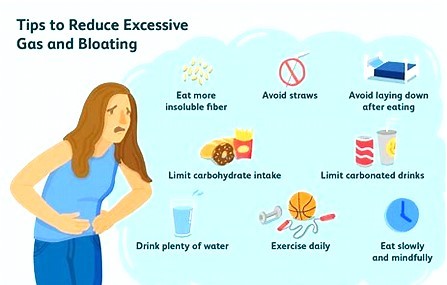Flatulence and bloating are common digestive issues that can leave you feeling uncomfortable and self-conscious. Fortunately, you can take simple steps to reduce these problems and improve your gut health. Seven practical tips to help you stop flatulence and bloating naturally.
What is Flatulence and Bloating?
Flatulence and bloating are common digestive issues that can affect anyone. While they are often temporary and harmless, they can cause discomfort and embarrassment. Understanding their causes, symptoms, and management is essential for maintaining digestive health.
Related Articles: Flatulence – Digestive Flatus
Flatulence: Definition and Causes
Flatulence, commonly referred to as “passing gas,” occurs when excess gas builds up in the digestive tract and is expelled through the rectum. This is a natural bodily function, as the digestive system produces gas during the breakdown of food.
Causes of Flatulence
- Swallowed Air: Eating too quickly, chewing gum, or drinking carbonated beverages can cause air to enter the digestive system.
- Diet: Foods high in fiber, such as beans, lentils, cabbage, and broccoli, are harder to digest and often produce more gas.
- Gut Bacteria: The bacteria in your intestines help digest food, producing gas as a byproduct.
- Medical Conditions: Conditions like irritable bowel syndrome (IBS), lactose intolerance, or celiac disease can lead to excessive gas production.
Bloating: Definition and Causes
Bloating refers to a feeling of fullness or tightness in the abdomen, often accompanied by visible swelling. Unlike flatulence, bloating doesn’t always result in the release of gas.
Related Articles: Natural Herbal Treatment for Flatulence and Symptoms, Causes
Causes of Bloating
- Gas Build-Up: Excess gas in the stomach or intestines can lead to bloating.
- Overeating: Consuming large meals can stretch the stomach, causing discomfort.
- Food Intolerances: Certain foods, like dairy or gluten, can cause bloating in people who are intolerant.
- Hormonal Changes: Women may experience bloating during their menstrual cycle due to hormonal fluctuations.
- Underlying Conditions: Gastrointestinal issues like constipation, IBS, or gastroparesis can contribute to bloating.
Symptoms of Flatulence and Bloating
Flatulence and bloating are common digestive issues that affect individuals of all ages. While not usually serious, they can cause significant discomfort and disrupt daily activities. Understanding the symptoms of these conditions is key to managing and addressing the underlying causes effectively.
Symptoms of Flatulence
The symptoms of flatulence are typically mild but can be uncomfortable or embarrassing. These include:
- Frequent Passing of Gas
- It is normal to pass gas up to 20 times a day. However, excessive flatulence may indicate digestive issues or dietary triggers.
- Foul-Smelling Gas
- The smell results from sulfur compounds produced during digestion, especially when consuming high-protein or sulfur-rich foods like eggs or broccoli.
- Abdominal Discomfort
- Some individuals may feel mild cramping or pressure in the abdomen before passing gas.
- Gurgling Sounds in the Stomach
- This happens as gas moves through the intestines.
Symptoms of Bloating
Bloating symptoms vary depending on the cause but often include:
- Abdominal Swelling
- The stomach may appear visibly distended or feel tight to the touch.
- Sense of Fullness
- A sensation of being “stuffed,” even if you haven’t eaten much, is common.
- Pain or Discomfort
- Bloating can cause sharp or dull pain, which may come and go throughout the day.
- Difficulty Passing Gas or Belching
- Trapped gas can create pressure, making it challenging to release.
- Nausea
- Some individuals may feel queasy, particularly after eating.
- Fatigue and Sluggishness
- The discomfort from bloating can affect energy levels and overall well-being.
Stop Flatulence and Bloating with These 7 Easy Tips
Flatulence and bloating can be uncomfortable, embarrassing, and disruptive to daily life. While they’re normal parts of digestion, excessive gas or bloating might indicate issues with your diet or lifestyle. The good news is that small adjustments can make a big difference. Here are seven easy tips to help you feel better and keep your digestive system in check.
Related Articles: 11 Natural Remedies for Flatulence
1. Identify and Avoid Trigger Foods
Certain foods are notorious for causing gas and bloating. Common culprits include beans, lentils, broccoli, cabbage, onions, carbonated drinks, and dairy products (for those who are lactose intolerant). Keep a food diary to identify which foods trigger your symptoms and limit your consumption accordingly.
2. Eat Slowly and Chew Thoroughly
Eating too quickly can cause you to swallow air, leading to bloating and flatulence. Take your time to chew your food thoroughly, as this aids digestion and minimizes air intake. Mindful eating can also help you recognize fullness sooner, preventing overeating.
3. Stay Hydrated
Drinking plenty of water is essential for maintaining a healthy digestive system. Water helps to move food through your digestive tract, preventing constipation—a common cause of bloating. Avoid sugary drinks and sodas, which can contribute to gas production.
4. Exercise Regularly
Physical activity stimulates digestion and helps release trapped gas. Even a short walk after meals can prevent bloating and promote bowel regularity. Yoga poses like the wind-relieving pose (Pavanamuktasana) are particularly effective for reducing gas and bloating.
Related Articles: Top Essential Oils for Flatulence Relief: Natural Gas Relief
5. Consider Probiotics
Probiotics are beneficial bacteria that support gut health. Adding foods like yogurt, kefir, sauerkraut, or kimchi to your diet can improve digestion and reduce bloating over time. You can also consider a high-quality probiotic supplement if necessary.
6. Avoid Artificial Sweeteners
Sugar alcohols like sorbitol, mannitol, and xylitol, commonly found in sugar-free products, can cause bloating and flatulence because they ferment in the gut. Check product labels and opt for natural sweeteners like stevia or honey instead.
7. Manage Stress
Stress can disrupt your digestive system, leading to symptoms like bloating and gas. Practice stress-reducing activities such as meditation, deep breathing, or yoga. A relaxed mind often translates to a calmer digestive system.
Final Thoughts
To stop flatulence and bloating, focus on making small, sustainable changes to your diet and lifestyle. Identifying triggers, staying active, and supporting your gut with healthy habits can make a significant difference. If symptoms persist or worsen, consult a healthcare professional to rule out underlying conditions like irritable bowel syndrome (IBS) or food intolerances.




